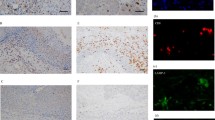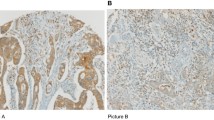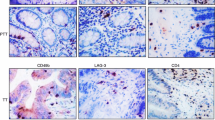Abstract
RCAS1 (receptor-binding cancer antigen expressed on SiSo cells) expression was determined in 107 esophageal carcinoma patients by immunohistochemical procedures and compared with tumor infiltrating lymphocyte (TIL) and dendritic cell (DC) infiltration to evaluate the effect of RCAS1 on immune responses in esophageal carcinoma. RCAS1 immunoreactivity was detected in 59 of 107 patients (55.1%). RCAS1 expression was significantly correlated with the depth of invasion, lymph node metastasis, and histologic stage. RCAS1 expression tended to be correlated with a lower TIL density in tumors with marked DC infiltration. The survival time for patients with RCAS1-negative tumors was significantly longer than that for patients with RCAS1-positive tumors. Especially, the prognosis was predicted by RCAS1 in cases with marked DC infiltration. Multivariate analysis revealed that RCAS1 expression was an independent prognostic factor. RCAS1 expression may play an important role in evading the immunological defense mechanisms in esophageal carcinoma.




Similar content being viewed by others
References
Pawelec G (2004) Tumour escape:antitumour effectors too much of a good thing? Cancer Immunol Immunother 53:262–274
Suda T, Nagata S (1994) Purification and characterization of the Fas-ligand that induces apoptosis. J Exp Med 179:873–879
Strand S, Hofmann WJ, Hug H, Muller M, Otto G, Strand D, Mariani SM, Stremmel W, Krammer PH, Galle PR (1996) Lymphocyte apoptosis induced by CD95 (APO-1/Fas) ligand-expressing tumor cells—A mechanism of immune evasion? Nat Med 2:1361–1366
Bennett MW, O'Connell J, O'Sullivan GC, Brady C, Roche D, Collins JK, Shanahan F (1998) The Fas counterattack in vivo:apoptotic depletion of tumor-infiltrating lymphocytes associated with Fas ligand expression by human esophageal carcinoma. J Immunol 160:5669–5675
Ikeguchi M, Saito H, Katano K, Tsujitani S, Maeta M, Kaibara N (1997) Correlation between the lymphocytic infiltration of tumors and the proliferative activity of cancer cells from surgically treated esophageal carcinoma. Oncology 54:311–317
Nagata S (1996) Fas ligand and immune evasion. Nat Med 2:1306–1307
Chappell DB, Restifo NP (1998) T cell-tumor cell: A fatal interaction? Cancer Immunol Immunother 47:65–71
Nakashima M, Sonoda K, Watanabe T (1999) Inhibition of cell growth and induction of apoptotic cell death by the human tumor-associated antigen RCAS1. Nat Med 5:938–942
Iwasaki T, Nakashima M, Watanabe T, Yamamoto S, Inoue Y, Yamanaka H, Matsumura A, Iuchi K, Mori T, Okada M (2000) Expression and prognostic significance in lung cancer of human tumor-associated antigen RCAS1. Int J Cancer 89:488–493
Noguchi K, Enjoji M, Nakamuta M, Nakashima M, Nishi H, Choi I, Taguchi K, Kotoh K, Shimada M, Sugimachi K, Tsuneyoshi M, Nawata H, Watanabe T (2001) Expression of a tumor-associated antigen RCAS1 in hepatocellular carcinoma. Cancer Lett 168:197–202
Takahashi H, Iizuka H, Nakashima M, Wada T, Asano K, Ishida-Yamamoto A, Watanabe T (2001) RCAS1 antigen is highly expressed in extramammary Paget's disease and in advanced stage squamous cell carcinoma of the skin. J Dermatol Sci 26:140–144
Sonoda K, Nakashima M, Kaku T, Kamura T, Nakano H, Watanabe T (1996) A novel tumor-associated antigen expressed in human uterine and ovarian carcinomas. Cancer 77:1501–1509
Sonoda K, Kaku T, Kamura T, Nakashima M, Watanabe T, Nakano H (1998) Tumor-associated antigen 22-1-1 expression in the uterine cervical squamous neoplasias. Clin Cancer Res 4:1517–1520
Kaku T, Sonoda K, Kamura T, Hirakawa T, Sakai K, Amada S, Ogawa S, Kobayashi H, Nakashima M, Watanabe T, Nakano H (1999) The prognostic significance of tumor-associated antigen 22-1-1 expression in adenocarcinoma of the uterine cervix. Clin Cancer Res 5:1449–1453
Sonoda K, Kaku T, Hirakawa T, Kobayashi H, Amada S, Sakai K, Nakashima M, Watanabe T, Nakano H (2000) The clinical significance of tumor-associated antigen RCAS1 expression in the normal, hyperplastic, and malignant uterine endometrium. Gynecol Oncol 79:424–429
Matsushima T, Nakashima M, Oshima K, Abe Y, Nishimura J, Nawata H, Watanabe T, Muta K (2001) Receptor binding cancer antigen expressed on SiSo cells, a novel regulator of apoptosis of erythroid progenitor cells. Blood 98:313–321
Banchereau J, Steinman R (1998) Dendritic cells and the control of immunity. Nature 392:245–252
International Union Against Cancer (1997) TNM classification of malignant tumors. 5th ed. John Wiley, New York
Fukuda K, Tsujitani S, Maeta Y, Yamaguchi K, Ikeguchi M, Kaibara N (2002) The expression of RCAS1 and tumor infiltrating lymphocytes in patients with T3 gastric carcinoma. Gastric Cancer 5:220–227
Saito H, Tsujitani S, Ikeguchi M, Maeta M, Kaibara N (1998) Relationship between the expression of vascular endothelial growth factor and the density of dendritic cells in gastric adenocarcinoma tissue. Br J Cancer 78:1573–1577
Stein HJ, Siewert JR (2004) Improved prognosis of resected esophageal cancer. World J Surg 28:520–525
Disis M, Calenoff E, McLaughlin G, Murphy A, Chen W, Groner B, Jeschke M, Lydon N, McGlynn E, Livingston R (1994) Existent T-cell and antibody immunity to HER-2/neu protein in patients with breast cancer. Cancer Res 54:16–20
Disis M, Knutson K, Schiffman K, Rinn K, McNeel D (2000) Pre-existent immunity to the HER-2/neu oncogenic protein in patients with HER-2/neu overexpressing breast and ovarian cancer. Breast Cancer Res Treat 62:245–252
Runger TM, Klein CE, Becker JC, Brocker EB (1994) The role of genetic instability, adhesion, cell motility, and immune escape mechanisms in melanoma progression. Curr Opin Oncol 6:188–196
Ferrone S, Marincola FM (1995) Loss of HLA class I antigens by melanoma cells:molecular mechanisms, functional significance and clinical relevance. Immunol Today 16:487–494
O'Sullivan GC, Corbett AR, Shanahan F, Collins JK (1996) Regional immunosuppression in esophageal squamous cancer:evidence from functional studies with matched lymph nodes. J Immunol 157:4717–4720
O'Mahony AM, O'Sullivan GC, O'Connell J, Cotter TG, Collins JK (1993) An immune suppressive factor derived from esophageal squamous carcinoma induces apoptosis in normal and transformed cells of lymphoid lineage. J Immunol 151:4847–4856
Ikeguchi M, Ohoro S, Maeda Y, Yamaguchi K, Fukuda K, Shirai H, Kondo A, Tsujitani S, Kaibara N (2003) Protein and gene expression of tumor-associated antigen RCAS1 in esophageal squamous cell carcinoma. Oncol Rep 10:1891–1894
Kubokawa M, Nakashima M, Yao T, Ito KI, Harada N, Nawata H, Watanabe T (2001) Aberrant intracellular localization of RCAS1 is associated with tumor progression of gastric cancer. Int J Oncol 19:695–700
Kato H, Nakajima M, Masuda N, Faried A, Sohda M, Fukai Y, Miyazaki T, Fukuchi M, Tsukada K, Kuwano H (2005) Expression of RCAS1 in esophageal squamous cell carcinoma is associated with a poor prognosis. J Surg Oncol 90:89–94
Nakakubo Y, Hida Y, Miyamoto M, Hashida H, Oshikiri T, Kato K, Suzuoki M, Hiraoka K, Ito T, Morikawa T, Okushiba S, Kondo S, Katoh H (2002) The prognostic significance of RCAS1 expression in squamous cell carcinoma of the oesophagus. Cancer Lett 177:101–105
Author information
Authors and Affiliations
Corresponding author
Rights and permissions
About this article
Cite this article
Tsujitani, S., Saito, H., Oka, S. et al. Prognostic Significance of RCAS1 Expression in Relation to the Infiltration of Dendritic Cells and Lymphocytes in Patients with Esophageal Carcinoma. Dig Dis Sci 52, 549–554 (2007). https://doi.org/10.1007/s10620-006-9408-6
Received:
Accepted:
Published:
Issue Date:
DOI: https://doi.org/10.1007/s10620-006-9408-6




